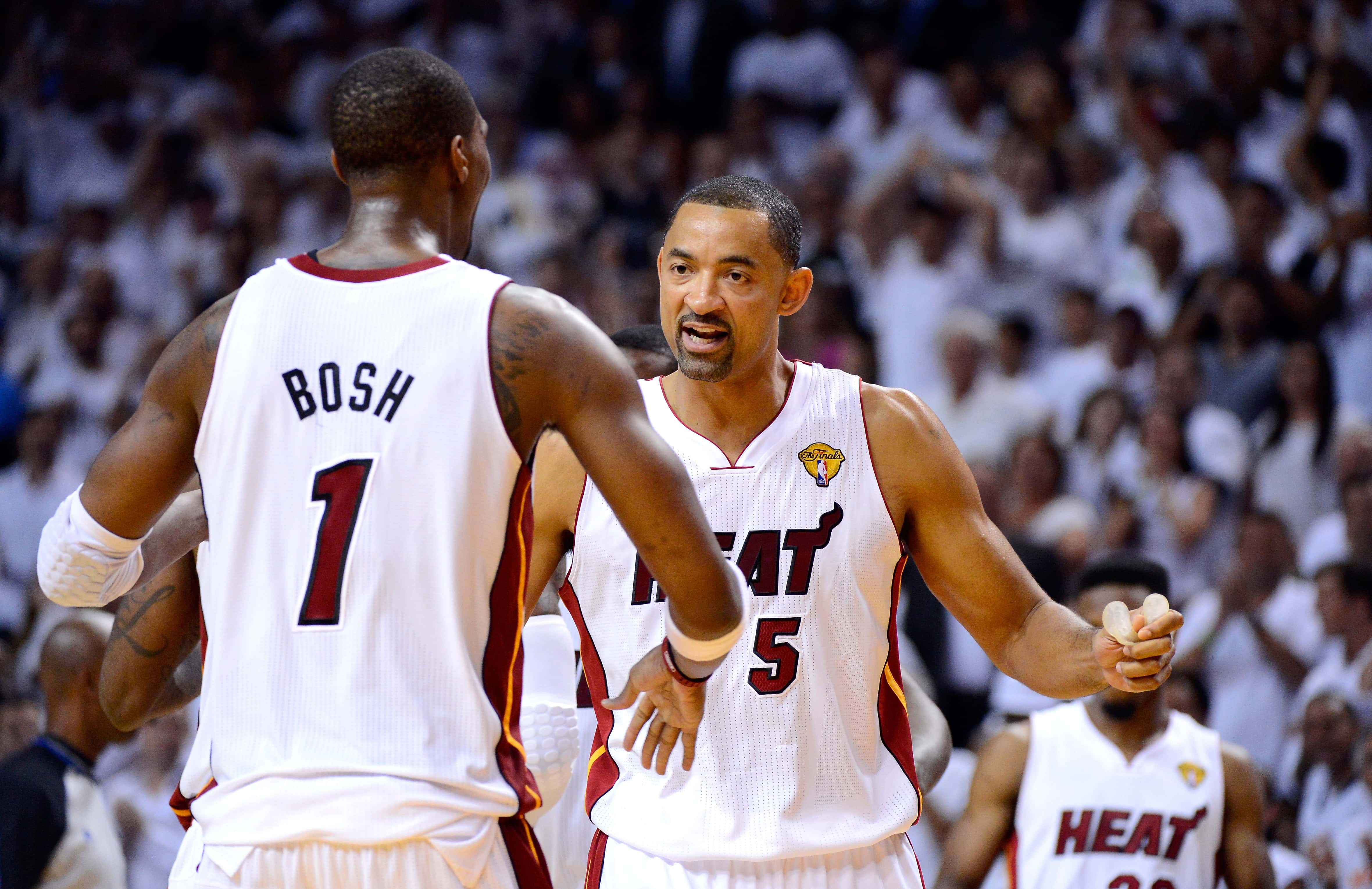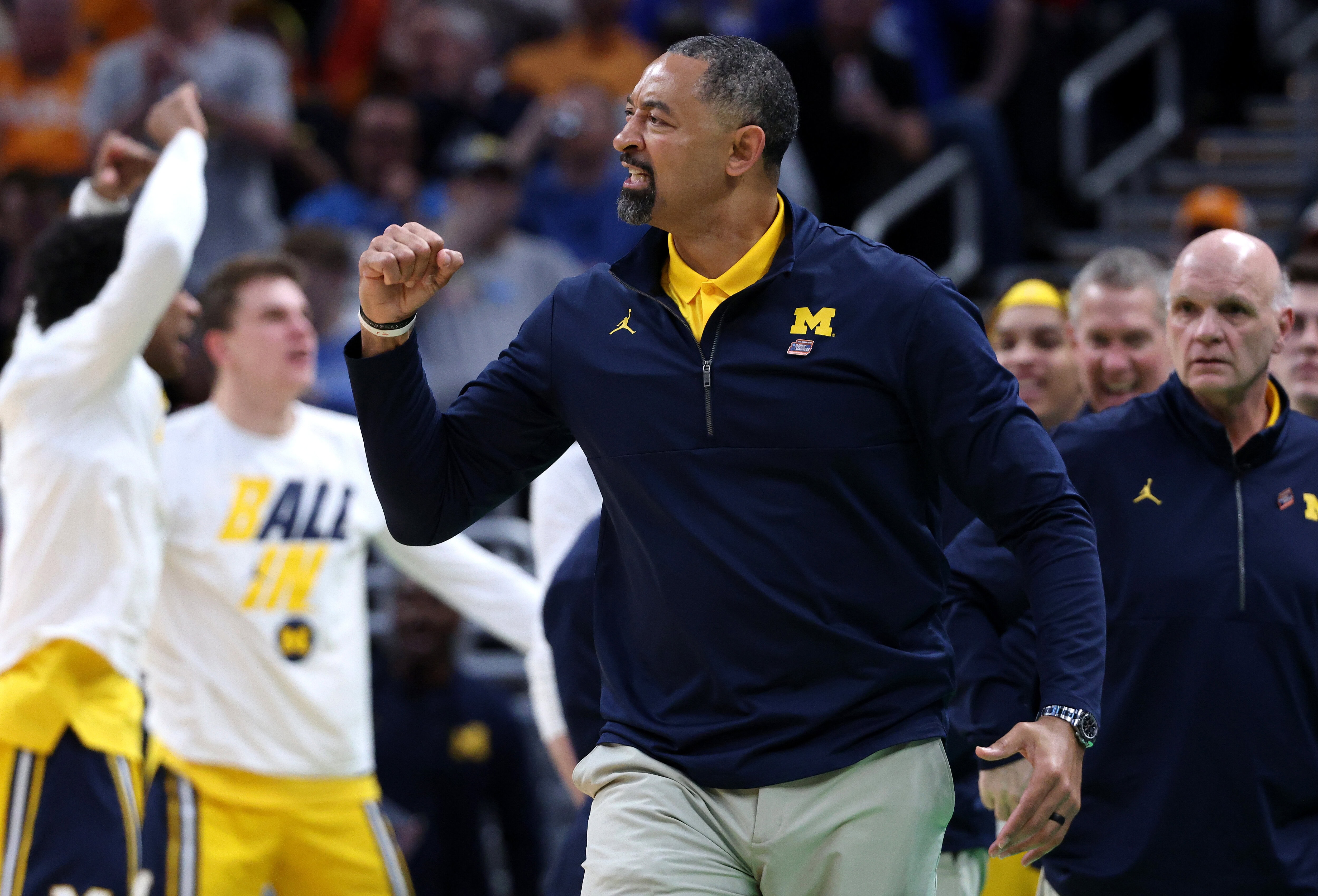Michigan’s former Fab 5 forward is back and busting brackets. While controversy cripples many, it only strengthens Howard when it comes to the sport (and the school) he loves.
You don’t have to like Juwan Howard. Trust, he’s heard it all.
The Michigan Wolverines legend grew up on government cheese in the projects of South Side Chicago and overcame more adversity than most. Following the sudden death of his guardian grandmother at 17, the traumatized teenager moved in with his high coach before going at it alone in affluent Ann Arbor.
To get by, he’d need some friends.
Assembling his tribe known as the Fab 5, Howard pivoted from power forward to volunteer recruiter. In a matter of months, he’d help assemble the most talented and talked about freshmen class college basketball had ever seen. Despite solidifying himself as a starter and taking the team from unpopular to unfazed, Howard endured more media scrutiny and hate mail than a polarizing politician.
Still, at only 19, Howard had his rebellious recruiting class in the NCAA Championship. While Coach K and his polished preps won the title in 1992, Howard has won the war 30 years later.
Now at 49 years old, the tough kid from Chicago has become the face of Wolverine basketball and paid accordingly.
Head coach Howard has his scrappy 11-seed squad in the Sweet 16 after defeating No. 6 Colorado State in the First Round and upsetting No. 3 Tennessee in the second round of South Region action.
March Madness is no stranger in Michigan. But how did Howard come to be at the center of it, yet again, in 2022?
Equity in Ann Arbor
When Howard arrived on campus in the fall of 1991, he brought his brothers.
As a member of the Fab 5, Howard helped sign more McDonald’s All-Americans that year than Dean Smith and Bobby Knight combined. While Jalen Rose resides as the trendsetter and Chris Webber as the top talent, it was Howard who engineered the revered recruiting class as essentially an orphan.
Behind the scenes, Howard became the grounding force of a team that went to back-to-back national championship games and totally revolutionized the swagger of the sport. His skills as a connector captivated the country regardless of the credit, making Michigan’s maize and blue branding $10.5 million in royalties just two years after he enrolled.

While racist fans and conservative critics ate at Howard and his teammates the whole time they were in Ann Arbor, the institution and top talent were quickly fed.
As noted, Michigan became a juggernaut in the licensed apparel game thanks to the team Howard brought together. After only two seasons, Webber became the first college sophomore to go No. 1 in the NBA Draft since Magic Johnson 14 years prior. In 1993, Webber would negotiate a $74 million contract before he even played his first professional game.
In his first season without Webber, Howard once again rose to the occasion and added value to himself and others.
As a junior, Howard helped Michigan secure a No. 3 seed in the 1994 NCAA Tournament. The Wolverines were ousted in the Elite 8, but big No. 25 was still named the Most Outstanding Player for the Midwest Region, leading the entire field in rebounds per game — a distinction Webber earned the year before.
Howard put up 30 points and 13 rebounds on the eventual national champion Arkansas Razorbacks, and then declared for the 1994 NBA Draft. He was selected fifth overall by the then-Washington Bullets.
That summer, Nike signed the University of Michigan to a six-year, $8 million deal. At the same time, Howard made his allegiance with the Swoosh official by becoming an official endorser. Between the brass of agent David Falk and Juwan’s juice as a founding Fab 5 member, Howard appeared in Nike ads aligned with U of M product — leveraging his likeness as a pro.
His hard work on the court and behind the scenes in Ann Arbor made Michigan millions in the moment, and it came back to Howard down the road.
The Professional
At only 21 years of age, Howard was making over $1 million per year just to play basketball.
After an impressive rookie campaign in the nation’s capital, Michael Jordan recruited Howard to play pick-up that summer in L.A. on the set of Space Jam. The dog days in the Jordan Dome took Juwan’s game to another level, earning All-Star and All-NBA accolades in only his second NBA season.
Famously, agent David Falk flexed his muscles by placing an escape clause in Howard’s rookie contract.
After ascending to high heights in only his second season, Falk made history by making Howard the NBA’s first player to sign a $100 million contract. Howard had spent years making millions for the NCAA and Nike as an amateur in Ann Arbor, and now, he had the opportunity to personally profit and raise the ceiling for earnings as a pro.
Like always, Howard led by example.
And his peers noticed.

By the twilight of Howard’s playing days, the game rewarded him with the one thing that evaded him as a high school stud and college connector: a championship. Howard served as a veteran presence on the Miami Heat from 2010-13 — the last three years of his playing career. While mentoring Miami’s Big 3 of LeBron James, Dwyane Wade and Chris Bosh, Howard basked in the glory of back-to-back NBA titles in South Beach.
The stage was set to transition into a role as a member of the Heat coaching staff.
Howard’s cultural cache from the Fab 5 made him a revered voice to LeBron as well as a helping hand to All-Star big man Bam Adebayo. From 2013-19, Juwan built his brand as a coach that could talk that talk because he had walked the walk at every level. His mix of timeliness and toughness touted Howard as one of the top talents in the landscape of leadership.
Howard’s hard work took him back to where it all began.
Howard’s Homecoming
Back in 1991, most Michigan alumni wanted nothing to do with Juwan Howard and what they felt he stood for.
Years later, that same school was begging him to be their leader.

In 2019, Juwan Howard signed a five-year deal worth up to $11.2 million to become the head coach in Ann Arbor. In many ways, the school was still eating off the success of the brand Howard had built. Prior to his arrival, Howard’s longtime teammates at Nike and Jordan Brand had signed the University of Michigan to a $169 million deal over the course of 15 years.
At that time, it was reported as the richest endorsement deal in all of college sports.
While Ann Arbor basketball was on the up and up from a face and branding standpoint, Howard inherited the tall task of rebuilding a roster that just went to the Sweet 16. Despite losing three stars from the previous year’s squad to the NBA Draft, Howard helped Michigan remain competitive in a campaign cancelled early due to the COVID-19 pandemic.
Much like in the NBA, Howard skyrocketed in only his second season.
In 2021, Howard was widely considered the best coach in college basketball. Famously, he took home all titles when it came to leadership — winning Coach of the Year honors from the AP, Sporting News, and Big 10 as well as the Henry Iba Award. That season, Howard became the first player in NCAA history to enter the tournament as a No. 1 seed as both a player and a coach.
Once again, he’d cash in on his ascent.
Following his accolade-studded 2021 season and calls from the NBA, Howard pushed the envelope by signing a five-year contract extension through the 2025-26 season.
The Detroit News states the new deal will bring him roughly $17 million, which wildly means he’s making more money annually than what Nike was once paying all of Michigan to leverage their logo.
Even after all the adversity, some fans still dislike the success story that is Juwan Howard.
During the regular season, before the Wolverines became a darling set to square off with No. 2 Villanova in the Sweet 16 on Thursday night, the program was at the center of controversy — Howard was suspended for five games for a postgame altercation with Wisconsin assistant coach Joe Krabbenhoft immediately following the Wolverines’ 77-63 loss to the Badgers on Feb. 20.
Haters took it as an opportunity to call for his firing.
Instead, Howard’s trademark resiliency showed itself again.
His story in Ann Arbor is far from finished, and he remains undeterred by the outside criticism. He’s heard it all, and it sure hasn’t stopped him yet.
It hasn’t stopped his alma mater’s unlikely March run, either.